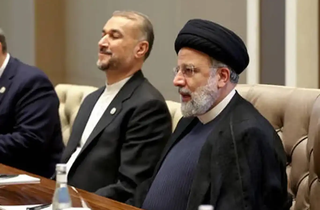The helicopter, carrying Raisi and Foreign Minister Hossein Amirabdollahian, crashed on Sunday in mountainous terrain. The wreckage was discovered early Monday after an overnight search amid blizzard conditions.
"President Raisi, the foreign minister, and all the passengers in the helicopter were killed in the crash," a senior Iranian official stated. Raisi's death was later confirmed by Vice President Mohsen Mansouri on social media and by state television.
State TV reported that images from the crash site showed the aircraft had slammed into a mountain peak, though the cause of the crash remains unclear. The state news agency IRNA identified the helicopter as a U.S.-made Bell 212.
Supreme Leader Ayatollah Ali Khamenei reassured the nation, stating there would be no disruption to state affairs despite Raisi's death.
Rescue teams battled severe weather and difficult terrain throughout the night to locate the wreckage. "With the discovery of the crash site, no signs of life have been detected among the helicopter's passengers," said Pirhossein Kolivand, head of Iran’s Red Crescent, on state TV.
The national broadcaster halted regular programming to show prayers being held for Raisi across the country, reflecting the profound impact of his sudden death on the nation.
Rescue teams fought blizzards and difficult terrain through the night to reach the wreckage in the early hours of Monday.
“With the discovery of the crash site, no signs of life have been detected among the helicopter's passengers,” the head of Iran’s Red Crescent, Pirhossein Kolivand, told state TV.
Earlier, the national broadcaster had stopped all regular programming to show prayers being held for Raisi across the country.
Born on December 14, 1960, in Mashhad, Iran, Ebrahim Raisi rose through the ranks of the judiciary to become a prominent political figure. He studied at the Qom Seminary, where he was a student of several high-ranking clerics. Raisi held various key judicial positions, including the Deputy Chief Justice of Iran and the Attorney General of Iran. He gained a reputation for his hardline stance and conservative views.
In 2019, Raisi was appointed Chief Justice of Iran by Supreme Leader Ayatollah Ali Khamenei. He ran for president in 2021 and won, taking office in August of that year. His presidency has been marked by a crackdown on dissent, stringent enforcement of morality laws, and tough negotiations in Iran’s nuclear talks with world powers.
Raisi's political career has not been without controversy. He has been criticized internationally for his role in the 1988 mass executions of political prisoners in Iran, which has cast a long shadow over his tenure in public office. (ILKHA)



 Dünya
Dünya
 Güncel
Güncel
 Güncel
Güncel
 Güncel
Güncel
 Güncel
Güncel
 Güncel
Güncel
 Dünya
Dünya
 Dünya
Dünya
 Güncel
Güncel
 Dünya
Dünya





